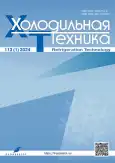Study of nonequilibrium regenerative heat exchange in positive displacement compressors
- Authors: Borisenko A.V.1, Zharov A.A.1, Valiakina A.V.1
-
Affiliations:
- Bauman Moscow State Technical University
- Issue: Vol 113, No 1 (2024)
- Pages: 5-12
- Section: Original Study Articles
- URL: https://freezetech.ru/0023-124X/article/view/322769
- DOI: https://doi.org/10.17816/RF322769
- ID: 322769
Cite item
Abstract
BACKGROUND: An important task in the design of thermal engines is the evaluation of power losses in different processes to determine the installation efficiency. One of the processes that generates power losses in the compressor is the process of nonequilibrium regenerative heat exchange (NRHE) of the compressed gas with the working cavity walls. This heat exchange occurs at a significant temperature difference, which can lead to noticeable power losses. Modern compressor design methods do not consider losses from nonequilibrium regenerative heat exchange and do not describe them separately from other types of losses.
AIM: This study investigates the mechanism of losses during regenerative heat exchange between the gaseous working flow out and the working cavity walls and evaluates the scale of these losses.
METHODS AND RESULTS: This work provides a qualitative description of the mechanism for the formation of losses from NRHE. As a result of solving the problem of unsteady thermal conductivity, an analytical expression for calculating such losses is derived based on the Gouy-Stodola theorem.
CONCLUSIONS: The study revealed that power losses from NRHE account for a significant share in the overall balance of machine losses. Parameters influencing the magnitude of these losses were also determined, and recommendations were developed to reduce them.
Full Text
About the authors
Artem V. Borisenko
Bauman Moscow State Technical University
Author for correspondence.
Email: borart@bmstu.ru
ORCID iD: 0000-0002-4818-3702
SPIN-code: 2859-5006
Cand. Sci. (Tech.)
Russian Federation, MoscowAnton A. Zharov
Bauman Moscow State Technical University
Email: zharov_a@bmstu.ru
ORCID iD: 0000-0001-9945-0850
SPIN-code: 8581-1809
Cand. Sci. (Tech.)
Russian Federation, MoscowAnna V. Valiakina
Bauman Moscow State Technical University
Email: avaliakyna@rambler.ru
ORCID iD: 0000-0002-7709-1209
SPIN-code: 7679-2022
Cand. Sci. (Tech.)
Russian Federation, MoscowReferences
- Kondrat’eva TF, Plastinin PI . Piston Compressor Machines. Chemical and Petroleum Engineering. 1971; 7 (9): 749–750. doi: 10.1007/BF01143289
- Harding EC. Positive Displacement Compressors. General Engineer. 1985; 96 (10): 290-303.
- Budagyan AP, Plastinin PI. Optimization of Reciprocating Compressors. Chemical and Petroleum Engineering. 1981; 17 (3): 142–144. doi: 10.1007/BF01157950
- Arkharov AM, Semenov VY. Analysis of Thermodynamic Efficiency of Small-Scale Natural Gas Liquefying Plant Operating on Medium-Pressure Cycle. Chemical and Petroleum Engineering. 2016; 51 (9–10): 656-664. doi: 10.1007/s10556-016-0102-z
- Kolosov MA, Borisenko AV, Manylov VV et al. Losses of Power in Thermal Engines in Nonequilibrium Regenerative Heat Exchange. Chemical and Petroleum Engineering. 2018; 54 (3–4): 239–246. doi: 10.1007/s10556-018-0469-0
- Arkharov AM, Arkharov IA, Beliakov VP et al. Cryogenic systems Vol. 2: Design of Apparatus, Plants System. Moscow: Bauman Moscow State Technical University Press; 2001.
- Arkharov AM, Marfenina, IV, Mikulin YeI. Cryogenic Systems Vol. 1: Basis of Theory and Design. Moscow: Bauman Moscow State Technical University Press; 2000.
- Stodola A. Steam and gas turbines. New York City: P. Smith; 1945.
- Kolosov MA. Theorem of Ideal Cycles of Refrigerating Machines. Chemical and Petroleum Engineering. 2016; 51 (9–10):674–682. doi: 10.1007/s10556-016-0104-x
- Arnold VI. Mathematical Methods of Classical Mechanics. Berlin: Springer-Verlag; 1989.
- Arkharov AM. Analysis of Energy Systems in a Single Thermodynamic Temperature Field. Chemical and Petroleum Engineering. 2010; 46 (1): 17–24. doi: 10.1007/s10556-010-9283-z
- Kolosov MA. The Guoy–Stodola Theorem Applied to Refrigeration Engineering. Kholod. Tekh. 2013; 8:40–44. EDN: SMJSFR [in Russian].
- Arkharov AM, Butkevich KS, Butkevich IK et al. Cryogenic Piston Expanders. Moscow: Mashinostroenie. 1974. [in Russian].
- Holmal JP. Heat Transfer. MacGraw-Hill. 2010.
- Kudinov IV, Kudinov VA. Mathematical simulation of the locally nonequilibrium heat transfer in a body with account for its nonlocality in space and time. Journal of Engineering Physics and Thermophysics. 2015;88 (2):406–422. doi: 10.1007/s10891-015-1206-6
- Bubnov VA. Remarks on wave solutions of the nonlinear heatconduction equation. Journal of engineering physics. 1981;40 (5): 565–571. doi: 10.1007/BF00822128
- Lykov AV. Application of the Methods of Thermodynamics of Irreversible Processes to Investigation of the Heat and Mass Transfer. Inzhenerno Fizicheskii Zhurnal. 1965;9 (3):287–304. doi: 10.1007/BF00828333
- Novikov II, Evko LS, Fotin BS et al. Trends in the Development of Piston Compressors. Chemical and Petroleum Engineering. 1981;17 (9): 462–465. doi: 10.1007/BF01148521
- Voronov VA, Leonov VP . Testing of a Scroll Expander in Various Modes. Chemical and Petroleum Engineering. 2015;51 (1–2):33–36. doi: 10.1007/s10556-015-9993-3
- Ivlev VI, Bozrov VM, Voronov VA. Testing a scroll machine in pneumatic motor-expander modes. Journal of Machinery Manufacture and Reliability. 2015;44(2):120–124. doi: 10.3103/S1052618815020053
Supplementary files










